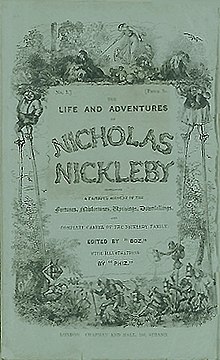The Life and Adventures of Nicholas Nickleby, more commonly called Nicholas Nickleby, is Charles Dickens' third novel. It was first published as a book in 1839. It's been adapted into at least two films, four series, and a stage version.
WARNING! Spoilers ahead!
As the title indicates, it's about Nicholas Nickleby. But not just about Nicholas. It's also about his sister Kate, his cousin Smike, his employers the Cheerybles, and a host of other characters.
The already-reviewed 2001 version is pretty faithful to the book, so there's no need to talk too much about the plot. Instead I'll talk about the characters. Nicholas and Kate are rather flat characters, who don't change much throughout the book, but for once that's not really a bad thing. They're likable as they are, and I don't think I would have enjoyed the story as much if they'd changed by the end. Smike is utterly heartbreaking. I came close to throwing the book at the wall when he died. As it was I had to put it down for a while until I stopped crying. Why, Dickens? Why did he have to die?
On the other end of the spectrum are the Squeerses. These fine specimens of filth are some of the most comically monstrous villains Charles Dickens invented. Fanny Squeers' "love" for Nicholas provides the only humour while he's at Dotheboys Hall. The whole family is loathsome and utterly horrifying, in spite of or maybe because of their ludicrousness, and their ultimate downfall is one of the most satisfying scenes I've read.
Less comical but just as despicable are Ralph Nickleby and Sir Mulberry Hawk. In some ways Ralph Nickleby is a foreshadowing of Ebeneezer Scrooge, but without the redemption and change of heart. From beginning to end he's a cruel miser who, among other things, tries to force Madeline to marry his decrepit co-conspirator so they can steal her money. Not even the circumstances leading up to his death can make him at all sympathetic. As for Sir Mulberry... ugh. That's all I can say about him. Thank goodness he dies at the end, though I really wish he had died sooner.
Believe it or not, this is actually one of Dickens' lightest novels. It has plenty of humour, long scenes that have virtually nothing to do with the plot (the story-tellers on the coach and the theatre stand out), and more genuinely decent people than can be found in Oliver Twist, the book that preceded it, or The Old Curiosity Shop, the book that followed it.
Nicholas Nickleby's main flaw is that Dickens was still a very young author, with less skill than he'd develop later, and it shows. The aforementioned long scenes unconnected to the plot are the main example of this. I'm sorry to say I found them boring, and hurried on to the more interesting parts of the story. But in spite of that, I thoroughly enjoyed this book.
Is it available online?: Yes, on Gutenberg.
Rating: 9/10.

No comments:
Post a Comment